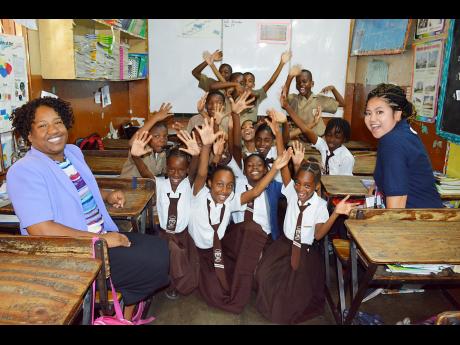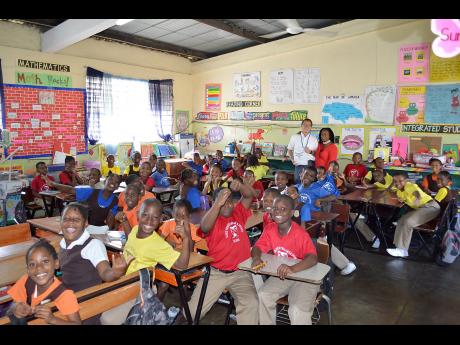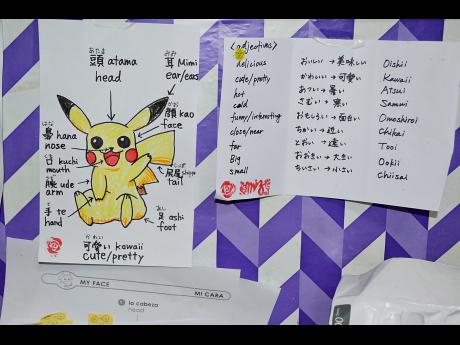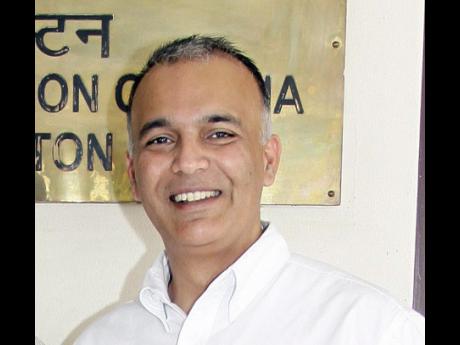Hi five! | Calculation Time continues to change the face of teaching mathematics
An animated set of students started playing rhythms on their desks while others clapped and swayed. Now comes the trick question: What were they doing? The obvious answers could be"They are in a music class"; or "It is free time, so they are having some fun". "Incorrect answer" (insert the flashing red light and buzzer going off).
The students of grade 5 at the St Francis Primary School, Kingston, are in their mathematics class. Yes, you read it right. Learning the intricacies of numbers is intimidating to many of us, to say the least. With a little help from the Jamaica International Cooperation Agency (JICA)-initiated Calculation Time, mathematics just became fun.
Calculation Time, an education tool used for primary mathematics education, was developed by a former JICA volunteers Miwako Sugawara, and is embedded in the official curriculum of the Ministry of Education.
"The initiative was introduced as a response to the need for students to develop mental prowess in working with numbers," said Seymour Hamilton, education officer, mathematics and educational technology, at the Ministry of Education, Youth and Information's (MoEYI) Core Curriculum Unit.
Developing skills
"Calculation Time is important in developing the skill sets of students as Jamaica strives to take its place within a fiercely competitive and highly globalised marketplace," Seymour added.
The approach is non-conventional, encouraging students to calculate mentally, a methodology they can apply to other subjects.
Calculation Time is working. Since it was introduced, schools that have implemented Calculation Time have seen marked improvements in the Grade 4 Numeracy Test Mastery Rate, from an average of 41.93 per cent in 2011 to 60.60 per cent in 2017.
The 17 students of Grade 5R said Konnichiwa ('Hello!', in Japanese) in unison in response to JICA volunteer Mizuki Sunakawa. She was teaching them multiplication, and the class went into their improvised music and dance routine and came up with the right answer.
"They were struggling with multiplication and division, especially with complex numbers," Sunakawa said. "With regular practice in mathematics and Calculation Time, they are showing marked improvement."
Their class teacher, Aishalee Carter, concurred.
"This approach (Calculation Time) has boosted the confidence of the children," said Carter, adding that though the approach was unorthodox, the students were grasping the concepts better.
Sunakawa, who is also a Japanese language teacher and a graduate student of the Naruto University of Education in Japan, served as a short-term volunteer in Jamaica to boost the JICA's efforts to boost mathematics proficiency.
Just fifteen minutes
"They just need 15 minutes of practice per day," Sunakawa said. "If they do it every day, they will learn and improve."
In another class, senior JICA volunteer Akira Masutomi, was getting students of Grade 3T, St. Francis Primary School engaged in Calculation Time. The reactions of the students here were similar to those of their grade 5 colleagues.
Fun and mathematics just became new best friends.
Both JICA volunteers were recommended by the Naruto University of Education based on an agreement between JICA and the university.
"The objective of the agreement is to promote the development and promotion of primary education in Jamaica by utilising the knowledge and human resources of the university," said Kenji Tobita, resident representative of JICA in Jamaica, adding that the initiative was also to develop the human resources of the Naruto University of Education in the field of international cooperation.
Masutomi is currently assigned to the MoEYI to strengthen Calculation Time implementation across Jamaica.
"Calculation Time is not only helping improve mental prowess in working with numbers, but it is also developing better appreciation for the subject itself," said Clover Hamilton-Flowers, assistant chief education officer at the Core Curriculum Unit.
Sunakawa, who returned to Japan after completing her tenure here, said that she saw potential in all the children with whom she interacted.
"They have to enjoy learning the subjects, and it will help them to learn better and faster," she said. "Both teachers and students need to find happiness."
Sunakawa found happiness, too, literally and figuratively. Her hair braided, she is a happy camper. The students, in the meanwhile, are on a quest to make mathematics a subject in which they are taking an interest and getting to have fun as they learn.






